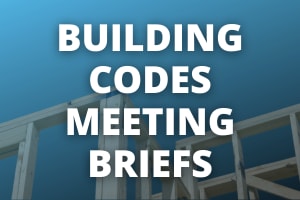Member Knowledge Centre
 member Knowledge centre
member Knowledge centre
The Knowledge Centre provides CHBA members with access to information and resources. It is a growing resource that is currently focused on updating members about national building code information. Please note that this information is a benefit of your membership, and should not be shared beyond your company/organization.
You can browse the items below, filter by category, or enter search terms in the "What are you looking for" box below.
This information is provided by CHBA for informational purposes only and cannot be used as an official or authoritative document.
Task Group on Overheating (2030 code cycle)

Task Group on Overheating (2030 code cycle)
August 11th 2025
To help clarify BC’s code and guide on single-zone cooling, Todd Backus from TECA (Thermal Environmental Comfort Association) explained how the CSA F280 standard is used to calculate cooling loads. He noted that F280 always shows cooling is needed because it’s based on peak conditions. Most tools using F280 aren’t designed to decide if cooling is needed, which would require a detailed engineering analysis. The guide applies F280 to a single room/single zone, but assumes that that the room has a door and that nearby rooms are treated like outdoor spaces, which can inflate the cooling load. Ventilation isn’t considered in the analysis.
A member mentioned that many HVAC designers would not dare using BC’s single-zone guide because of liability concerns related to deaths caused by overheating.
CHBA and other industry members raised concerns that modern homes often have open layouts and better energy performance—airtightness, HRVs/ERVs, insulation, and solar heat gain limits—making them less prone to overheating. It was clarified that rooms like master bedrooms with doors could be used to meet BC code.
BC government reps acknowledged the guide’s limitations and said it was developed quickly. They noted portable ACs are supported for older homes but not ideal for new builds. During the heat dome, even high-performance homes overheated due to the lack of a cooling temperature limit in the code.
The TG Chair reminded members of ongoing work: updating climate data, studying humidity impacts, and exploring prescriptive passive cooling options for the 2030 code.
For more information, contact Frank Lohmann (frank.lohmann@chba.ca)
Additional Info
Download File : 2020-05 TG-OH (NMCC-CCA) MtgAgend Book-Augut11,2025 (1).pdf
